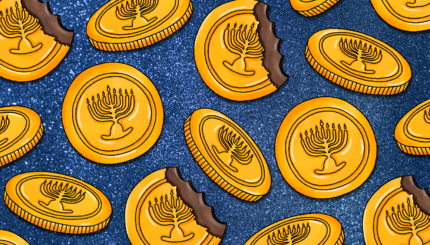As the national anthem of Israel proclaims, for two thousand years the hope of returning home has remained alive in our hearts. Defeated by Rome, weak and powerless, we refused to accept that might makes right. We hoped against all hope, never forgetting our identity as Jews and our connection to our ancient homeland. During the long night of our exile, Jews throughout the world prayed and dreamed to come back to the Land of Israel and to create within it a Jewish commonwealth according to the visions of the biblical prophets. We longed to rule ourselves and to live in freedom and in dignity.
Today we have come home. The Zionist movement, the national liberation movement of the Jewish People, has succeeded beyond our wildest expectation. It is good to be home. We savor the sweet taste of having a place that we can call our own.
We know more than almost any other people the pain of expulsion and the bitterness of uprootedness. We know the power of holding on to our dreams; we know the righteousness of never abandoning the connection to our homeland even when forced to be far away from her for much too long. We know that hope is never lost and that dreams can come true.
We should, therefore, be the first people on earth to embrace the dreams of other exiled peoples who fervently long to come home. We should recognize the legitimacy of their struggles and the righteousness of their cause. We should encourage their efforts and lend them support. We should never tell them to accept the decree of history, never chide them that they are sore losers who ought to give up and move on.
Indeed the Torah tells us: “Do not oppress the ger, for you know the feelings of the ger for you were gerim in the land of Egypt” (Exodus 23:9) and “You shall love the ger for you were gerim in the land of Egypt” (Deuteronomy 10:19).
The ger is the stranger, the one who has left his homeland and now lives in exile. He is downtrodden and often oppressed. He longs to go home. We were gerim in Egyptian exile. We know what it feels like. It is seared into our national consciousness, part of our Jewish DNA. And because we know what it is like to be oppressed in exile, we should never belittle the experiences of other nations that are uprooted from their ancestral lands and oppressed in exile.
What the Torah tells us to do makes perfect sense. The world would be an infinitely better place if we practiced what it preached. But it is terribly difficult because it flies in the face of basic human psychology. Wounded people wound. Ask any therapist who deals with kids from broken homes, or with victims of sexual abuse and trauma. Our tendency is to lash out and dish out what we got. Victims so often make victims out of other people.
And what is true for individuals is true as well for whole societies.
About 60 to 80% of the Palestinians in Gaza (and about 25% of the Palestinians in the West Bank) are gerim in the original biblical sense of the word. They are refugees – or the children or grandchildren of refugees – uprooted in 1948 from their homes in what is now Israel.
As Jews, we must first and foremost acknowledge and recognize them as such, as gerim whom the Torah asks us to empathize with and to embrace.
This is extremely difficult for a myriad of reasons related not only to human psychology, but also to Jewish identity, events of the past century, and of course events of the last few years, but would clearly be a game-changer in Israel’s relationship with Gaza and its people.
What would happen if we Jews and we Israelis could reach out to the Gazans with love and understanding? What would happen if we could listen deeply to their story, respect their experience and their identity, and acknowledge our historical responsibility? What would happen if we sincerely wished – and saw it as our religious obligation – to do our utmost to alleviate their plight?
Rocks, rockets, knives, bombs, and incendiary balloons are dangerous and frightening. It is natural for us to respond to events on the Gaza border with fear and military might. But what if we could open our eyes and see that the Great March of Return is also what it claims to be – an expression of longing for the land that was lost, a mostly nonviolent assertion of identity, an effort to show Israel and the world that the Palestinians will never accept being cooped up in the tiny Gaza Strip with no life and no livelihood.
We could begin a process of healing. Just the listening and the acknowledgment would go a long way because when people are validated, some of their anger begins to dissipate. After being respected and listened to, they might themselves begin to listen to and respect us. They might be able to hear our story of deep connection to the land, of exile and return.
Mutual validation would enable both sides to look more rationally at our circumstances and to begin to escape from the victim mentality that stymies our efforts to move forward towards reconciliation. The two sides might begin to accept that both we and they belong to the same land.
We have convinced ourselves that this is a zero-sum game. We cannot admit that there is any legitimacy to their claims to the land, we cannot allow any chink in the armor of our narrative that says there was never any such thing as a Palestinian people so they have no right to talk about going home, and in any case we won, they lost, so tough luck. We convince ourselves that in Gaza there is only violence and terrorism and that the only language in which we can speak to them is that of military might.
Who knows what solutions we could find were we to validate them and they to validate us? We might go beyond the two-state – one state dichotomy and explore hybrid models more fitting to our reality, like the model of the Two States One Homeland movement: Two states, Israel in the 1967 borders and a Palestinian state in the West Bank and Gaza, but instead of two separated states they would be bound together by open borders, freedom of residency and confederation. As part of a freedom of residency, the right of return would be granted to a large number of Palestinians who would be residents of Israel but citizens only of the Palestinian state (thereby sidestepping the so-called demographic problem). Settlers could stay in the West Bank and even return to Gaza – as citizens of Israel and not of the Palestinian state. The Confederation of the two sovereign states would guarantee the rights of those Palestinians and Israelis living within the borders of the other state, and would also give both sides the sense that their connection to their entire homeland, from the Jordan to the Mediterranean, is honored.
Other solutions might present themselves as well. We have delegitimized, dehumanized, and tried to pound each other into submission long enough. Perhaps we should try listening to each other.
Dedicated to my brave friends Manar al-Sharif, Rami Aman, and the members of the Gaza Strip Youth committee, together with all the long-suffering people of Gaza.



